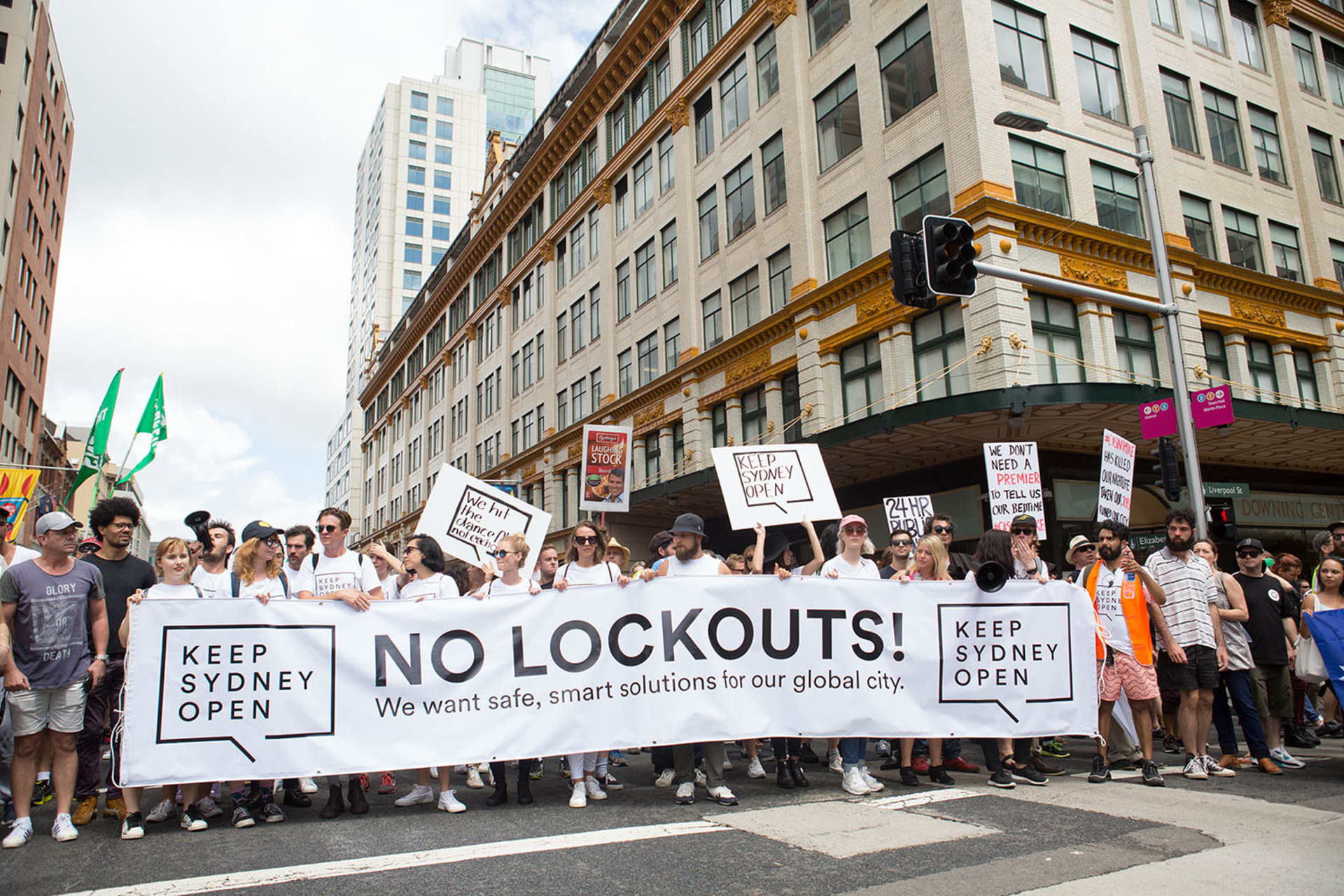
Inside The Battle For Sydney’s Nightlife
On January 11, 2014, the family of 18-year-old Daniel Christie made the heart-wrenching decision to turn off his life support after he was admitted to the hospital unconscious on New Year’s Eve. The circumstances of his death were sickeningly familiar, as another 18-year-old, Thomas Kelly, died in July 2012 when a stranger attacked him on the streets of Sydney, Australia’s inner-city nightlife district, Kings Cross. Christie and Kelly both suffered severe head trauma from unprovoked blows to the head that Australians referred to as “king hits” until Christie’s family released a statement pleading for the term to be changed to “coward’s punch.” Their deaths seemed to spark a chain of events that have and continue to transform the country’s biggest, glossiest city.
Ten days after Christie’s death, the state of New South Wales (NSW)—of which Sydney is the capital city—responded with a harsh new set of laws that passed through parliament in one day and made alcohol public enemy number one overnight. The Central Business District (CBD) Entertainment Precinct restricted the sale and consumption of alcohol in Sydney’s late-night hotspots within and beyond its little vein of vice, Kings Cross, which was home to clubs, live music spaces, bars, hookers, strip clubs and junkies. These “lockout laws” involved a liquor freeze that prohibited the establishment of new alcohol-serving venues in the specified areas, a 10 p.m. curfew for all bottle shops and restrictions on what sorts of alcohol could be served at different periods throughout the night: no shots or strong cocktails after midnight and no alcohol at all after 3. Oh, and you must get to the venue by 1:30 a.m. or you will be locked out.
To some, the lockouts are unnecessarily punitive, long overdue, a total farce, or don’t really make much of a difference. But the impact the lockouts have wrought on Sydney’s late night cultural producers—clubs, performance spaces and creative hangouts in Sydney are closing—are indisputable. Venue owners, promoters, hospitality workers, artists and punters feel the hurt. At first the antidote to the CBD lockouts seemed obvious: relocate your late nights outside the lockout zone! But as more people flocked to outlier neighborhoods, Liquor Accord associations, which voluntarily implement alcohol-trading restrictions, clamped down. Vendors that declined to participate in local accords were scrutinized by authorities with extra compliance checks and restrictions. The message is clear: if you serve alcohol inside or outside the lockout zone, you will be controlled—unless you own a high-profit casino in Sydney.
While lockouts and liquor accord pressures forced downtown to dim early, the NSW government approved a license for Australian business tycoon James Packer to extend his casino empire from Melbourne and Perth to Sydney. Packer’s Crown Casino will be Sydney’s second and thus the only competitor to The Star, which held an exclusive license to operate in the city from 1995 until the Casino Control Amendment Bill goes into effect in 2019. Evidence shows that the amendment’s approval in November 2013 was the result of a conspiracy to take down the monopoly by former Star employees and then-Premier Barry O’Farrell, who resigned in April 2014 amid corruption allegations totally unrelated to the casino scandal.
But while the bill’s origins and motivations are shady, the result is obvious: two of Sydney’s most lucrative ventures, which will earn the state treasury an estimated $6 billion by 2020, will hold the exclusive legal right to serve alcohol to late-night revelers downtown. More people are already flocking to The Star after hours, and more money is pumped into its poker machines and hedged on its game tables, which means more revenue; so far The Star has reported a 52 percent increase in the 2014-15 economic year. But it’s also meant more drunken disorderly crimes and an 88 percent increase in alcohol-related non-domestic violent assaults, which undermines the government’s assertion that lockouts were the only or the best solution to alcohol-fueled violence—or that they were introduced to keep people safe in the first place.
In recent months, citizens and representatives from Sydney’s creative communities have started to fight back at the apparent injustices and hypocrisies. Thousands have gathered for rallies organized by anti-lockout groups like Reclaim The Streets and Keep Sydney Open, the latter of which managed to overcome the fragmented nature of other opposition efforts to date and captured the growing groundswell of unrest on February 21 with 15,000 marchers. Much of the public debate around the lockouts has tended to circle around one particularly slippery word: value. What value should be placed on nightlife? What type of values are held dear in a society where people in the streets are punched in the head and die? What has more value to the community: partially founded fears or unrestricted freedoms? It’s a series of questions that Sydneysiders from all corners of the issue are increasingly being called on to answer. Here we’ve compiled the responses from key people impacted by the lockouts.
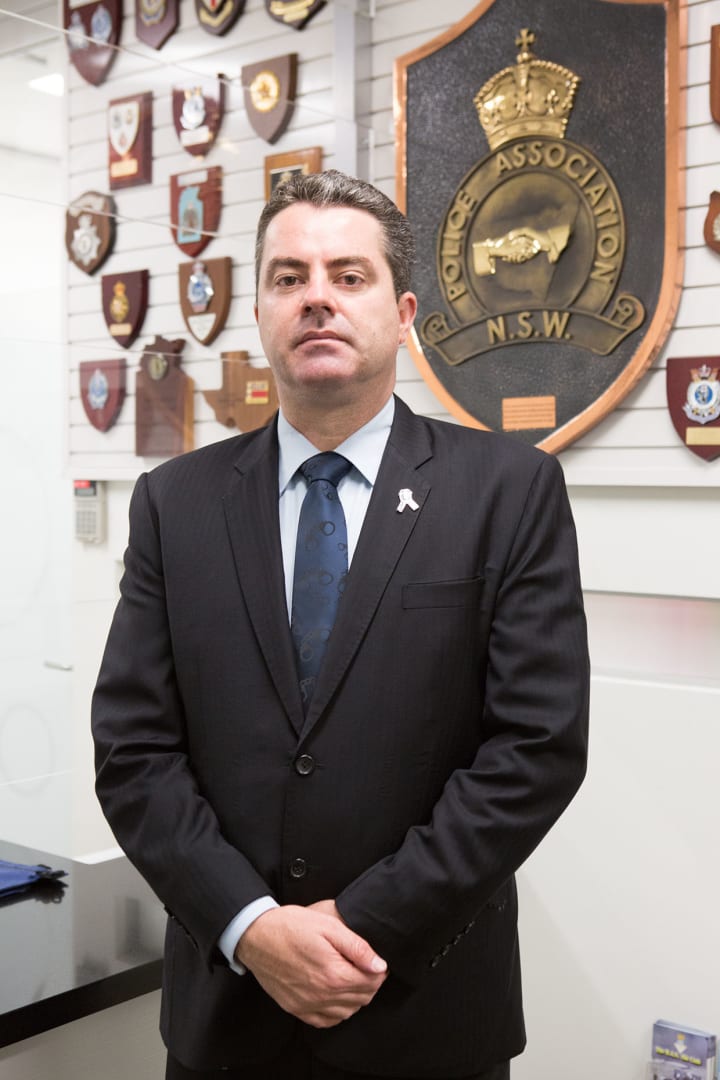
Scott Weber, the President of the Police Association of New South Wales (NSW) and spokesperson for the pro-lockouts lobbying campaign Last Drinks, defends the nightlife restrictions in the offices of the Police Association.
I’ve got heaps of mates in the pub and music game—all police do. It’s our bread and butter, dealing with licensed premises. Last Drinks is a coalition of subject matter experts, doctors, nurses, ambulance officers and police. It’s made up of representatives from frontline emergency services that were at breaking point with regards to workload and morale-sapping ongoing trauma to the community that we could prevent, but no one was doing anything about. Day in and day out, these people have to tell families and friends that their loved ones have been seriously injured or even killed.
You can’t have personal responsibility when you’re drinking or taking any substance that alters your perception of reality in a good, bad or indifferent way. Anyone who’s ever had a drink is quite aware of that. So we started Last Drinks in 2008 and built up a lot of community support, especially in churches and community groups. The Labour government was in power then; they called the lockout measures in Newcastle a “nanny state.” “We want to be an international city, so we need a nighttime economy,” they said. But there are numerous major cities that close before 3 a.m.: Los Angeles and, previously, London. Now London is open 24 hours, and it’s having its own issues.
Australian drinking culture is different. At your 18th and 21st birthday party you drink to get drunk, and you’re a champion if you throw up and get paralytic and make a dickhead of yourself. That goes for me, my family, my friends, my colleagues. That’s just the way it is.
I’m not saying whether it’s right or wrong—that’s just our perception with drinking. It was ongoing, and we said, “This is going to get to breaking point where the government will introduce legislation.” Then we had two very big campaigns in 2012 and 2013 to introduce one-punch legislation, and eventually the NSW Premier at that time introduced restrictions in the Central Business District (CBD) and Kings Cross.
We’ve seen an astronomical reduction in assaults after dark. The whole model was premised on Newcastle, a major metropolitan city where there was a 37 percent reduction after dark in assaults and alcohol-related violence. The reason we used Newcastle is because ours is an evidence-based campaign. Criticism of it is negated by the evidence. There’s heaps of studies that indicate that a higher availability of alcohol and a closer proximity of alcohol venues results in more alcohol-related violence.
Technically, looking at statistics and assaults, we probably would have advised a midnight curfew. But we were realistic; that’s why we said 3 a.m. It’s not about being punitive to businesses and communities; it’s about keeping everyone safe. The proof’s in the pudding: the people who actually live in Kings Cross are ecstatic about the lockouts. There are thriving businesses there—you just need to go to the restaurants. That’s what people go to Kings Cross for now. They go to have a beautiful meal, a nice drink, and they probably spend more money than the average punter who would have gone up there at 11 o’clock to have drinks.
So in the city, yep, the culture’s changed. We see businesses starting to go bankrupt, but as far as I’m concerned, they were poorly managed and poorly functioning businesses. The Rocks [neighborhood in Sydney] is a prime example. For hundreds of years, The Rocks was full of prostitution and rum, full of trouble. Now it’s upper class, residential and the bars up there are not late traders. Kings Cross is also a residential area. There’s two strips full of licensed premises, and the rest of it is some of the most expensive real estate in the area. If someone’s thinking about going to Kings Cross to get a 24-hour license and run a massive liquor barn where people can sit there and drink copious amounts of alcohol into the wee hours and then stumble into someone’s backyard where they’ve paid an astronomical amount to live—well, those people are delusional.
Kings Cross was a meeting point. People knew that’s the last port of call. That’s a place where I can go and knock on 50 [nightclub or bar] doors, because if I get knocked back [denied entry for being too drunk] by the first ten, I’ve still got another 40 options. But that also causes problems, because after I’ve been knocked back the tenth time I’m pretty shitty [angry]. I’m mumbling and swearing to myself, I build myself up. I may punch the next person I bump into, or I may be a victim myself.
I don’t think critics of the lockout laws have a leg to stand on in regards to retracting the last drinks law. There’s always winners and losers. When you do a risk-benefit analysis, you have to ask yourself: do you want a few people missing out on their livelihood and propensity to make a lot more money, or do you want people to be safe and actually come home? For us, it’s not about profit; it’s about safety.
Three veteran Sydney DJs and promoters meet at the Civic Hotel, a well-known pub in the CBD that hosts regular club nights in its plush basement space, Civic Underground. Over drinks, the three discuss the farcical, frustrating and uncertain nature of being a DJ, party promoter and punter in the lockout era.
Simon Caldwell: Apart from having less work around because there’re fewer venues, there’s a general feeling that we’re being harassed. It’s not like these are really sensible laws and implications that were well thought-out. It was a kneejerk reaction at the time with all these unintended consequences unfolding now. Everyone is coming down hard on nightlife. We kind of feel like we have to justify our existences to a certain extent.
David Stuart: Nightlife is being kicked around without any real logic on why “alcohol-fuelled violence” actually happens in the community. Burdekin has never had an issue, but all of a sudden we’re deemed “high risk” and we’ve got the eye on us. For what reason?
Magda Bytnerowicz: Because someone said so.
DS: If you go to a nightclub, most people are there for the music, to dance and have fun and socialize. We’re providing entertainment. They’re not there to get drunk and cause fights. But if you got to a big beer barn or big pub, all there is to do in those venues is drink.
SC: These things are reactions to real events; they came from those two kids getting killed. Although both incidents happened outside of what any lockout law would have affected because they occurred before the curfew, politicians needed to be seen to be doing something because people have lost faith in the safety of their children. The laws they’ve introduced haven’t made any impact on that. They’ve moved the problem, tinkered around at the edges, put the fear of God into some people and destroyed some businesses.
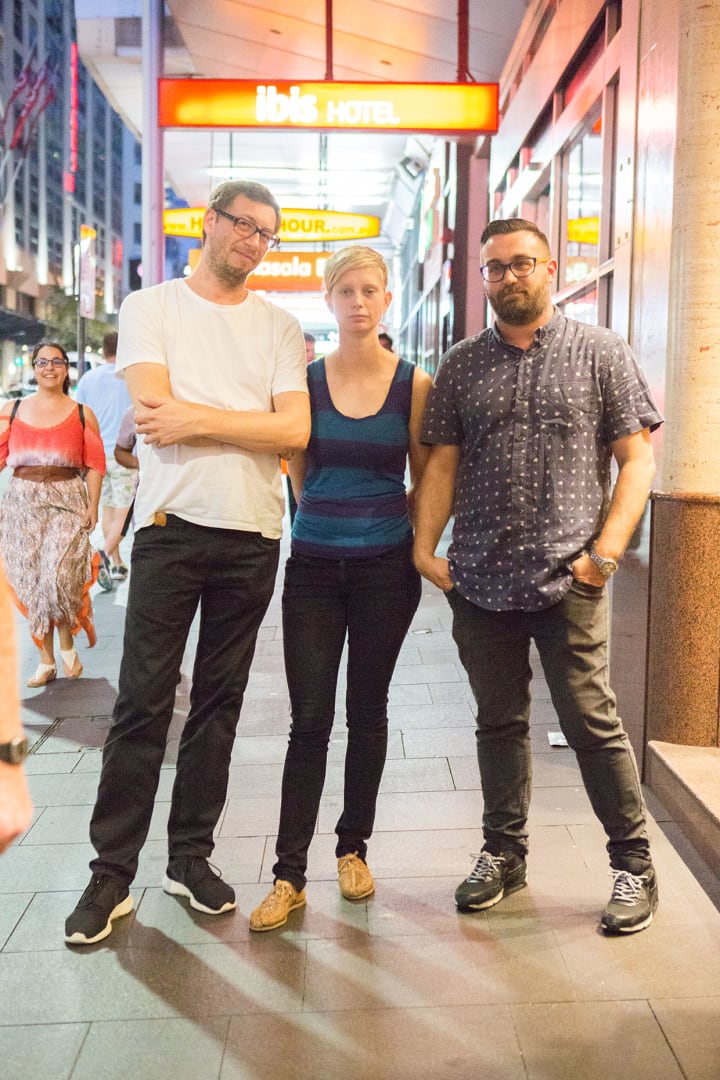
Nobody wants to see that happen, and drunken violence is an issue in our society for sure—but I think we need to separate those two things out because I don’t think they’re necessarily connected. One might exacerbate the other, but it’s the violence that’s the real issue.
MB: It’s a deep-seeded issue—masculinity, violence, male culture. Who thinks it’s okay to punch someone in the head for no reason?
SC: It’s rugby league culture, UFC culture. When will we stop idolizing those people? People need to be sent the message that it’s never okay to go up and hit someone. Like, never. It doesn’t matter if you’re drunk or sober. A hardline government response to violent incidents and the deaths that result from them is hard to argue with, as you don’t want to be seen as an apologist for drunken violent idiots. That’s the last thing we want to be. Politicians can stand up and say, “Look, we’ve done something!” But there’s so many other areas you can focus on rather than simply closing bottle shops at 10.
MB: Bottle shops are so paranoid about the fine they’ll get if they stay open past curfew that they’re shutting at 9.50 p.m. It’s more deeply endemic than that in responsibility.
SC: It’s a societal mentality of “We need to protect people from themselves,” but it feels like it’s gone past the overreach by a long way. We already have laws regarding alcohol—plenty of them. You can’t serve someone if they’re drunk and they can’t come in the venue. Those things are already done.
DS: Yeah, enforcing the laws that were put in place before the lockout would have solved the problems.
SC: It’s the whole concept that you can legislate against bad things happening.
MB: And that erodes a person’s ability to take responsibility for themselves, which is one of the fundamental problems with any of the legislation regarding late-night drinking. We haven’t had any issues until the lockout laws, even at warehouse parties. People came to those with cases of beer at 10 o’clock. Now when we hold parties at licensed venues, we have to turn people away.
SC: Because they’re pre-loaded [already drunk], right?
MB: Yes! It happens even when we’re at a venue located outside the lockout zone and all the others in the area are in a liquor accord and voluntarily lock out. We never used to have problems with people being dickheads at our parties—none whatsoever. But the minute there’s only one venue in an area that people can go to, and it just so happens we’re having a party there, they show up maggot drunk and for some reason wanting to cause trouble.
DS: Over the years, one of the things I’ve found that has combatted people getting too drunk in nightclubs is having longer trading hours—not shorter. They pace themselves, they come out a bit later, they take their time and they go home when they need to go home—not when they’re pushed out on the footpath at 3:30.
SC: The more you can dissipate that, the better. In Europe people aren’t trying to drink five beers in an hour.
MB: That’s a cultural difference. My understanding is that in most continental European countries it’s poor form to be seen completely out of control. It’s embarrassing. Here it’s like a badge of honor.
DS: We noticed when the lockout laws came in that a lot more intoxicated people rock up to the venue. We can’t let in anyone who’s even possibly drunk. We don’t want those people in the venue—it’s too risky for us. On average we’re losing three hours of trade per night. We can’t employ as many door, bar or promo staff. A lot of people are losing their jobs, and a big percentage of people who go to bars and nightclubs work in hospitality. They work in a restaurant until 10 o’clock and then go out to socialize. Generally, the only place you can go to at that hour is a bar or club. So it just feels like everyone is being pushed towards having a nine-to-five job; there’s no perpetuation of any nighttime economy or even late-night restaurants. You can’t actually go out and have a dinner after 10 o’clock in Sydney anymore.
MB: Or a coffee! Melbourne is going completely the other way. It’s cultivating a late-night economy in retail and food service, not just venues and nightclubs.
SC: I know a lot of young people who are into music and arts, and yep, they’re moving to Melbourne. I have noticed it does stop people wanting to keep on in Sydney. We need groups of industry people who are directly affected to speak up, but my feeling is that the lobbying power of those groups is really, really small. What we need is a group that has like, 100,000 punters—members of the public. That will get heard. As much as we’ve got things to say, it’ll just get a nod from anyone in power and then ignored. I don’t know how to create that groundswell.
DS: If you can get 50-60,000 people to a music festival, surely you can get 50-60,000 people to a protest. The problem is that the people putting on these big events don’t want to upset the apple cart, because then you start getting too much attention from the police and government and you’ll never be able to put on a 50-60,000 person event again.
MB: That feeling of not being able to make a difference is probably what’s at the root of this lack of action. Sydney’s never been an openly political city.
DS: I had a conversation with someone yesterday because I had a bit of a whinge online, and they were like “I don’t like it when everyone’s so down on Sydney.” My opinion is: we should be down on Sydney! We should be getting upset. I’ve seen what George Street was like, and what Kings Cross has been like. All that needed to happen was for the police to start actually enforcing the laws which were already in place.
SC: If the police had started policing the Cross with ten groups of two cops, instead of one group of 20 cops—
MB: —ideally, the same ones every weekend—
SC: —it would probably have been quite different. You need to nip this stuff in the bud. If someone looks like they’re going to cause trouble, as a policeman, go tap them on the shoulder and have a quiet word. That’s good policing. Then that person didn’t get to that state, the cop didn’t have to do anything serious and everyone left that situation relatively happy.
MB: My gut says it’s going to get worse before it gets better. We always take a break over the Christmas and New Year period, but we’ve extended it this year because we’re not entirely sure what and how we want to go next. We get offered international artist bookings and we have to say no because we’ve got nowhere to put them. I’m painting a really negative picture, but we put our hearts and souls into these events, and we’re getting to a point where we’re not even sure if we can be bothered anymore. We’re gonna try to keep it small and local moving forward, try to shore up the sentiment about resistance and keep that feeling that everyone who can do something is doing something.
DS: We’re trying to prove to the powers that be that clubbing is not a bad thing. We’re abiding by the law. We’re trying to keep council and licensing happy. We’re going to keep trying it until we can’t anymore.
SC: We’re outside of the lockouts, but we’ve certainly felt the impact. We’re virtually being told that it’s all coming from the “head office” so the local cops don’t really have a say in it. We had eight cops come down on New Year’s Eve who were a little bit unpleasant and heavy-handed. I mean, if you open any door in Sydney on New Year’s Eve, there will be some intoxicated people there. Let’s be real. Alcohol is still legal.
DS: Don’t say that too loudly.
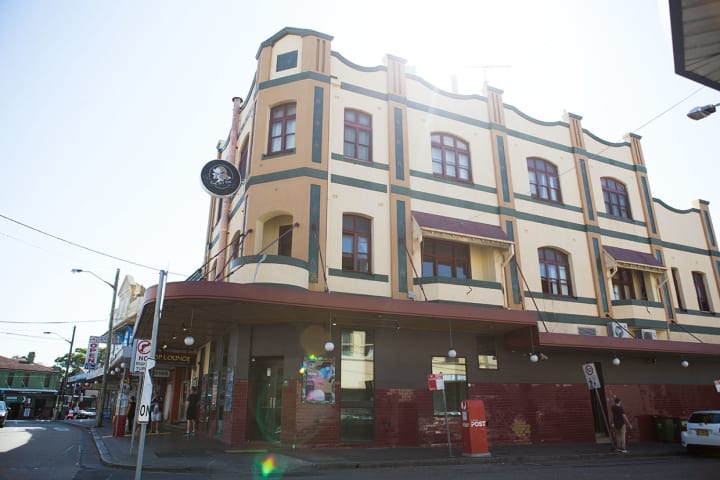
Kerry Wallace, Music Director at The Sly Fox, talks (with evident restraint) about adopting—and then rejecting—the self-enforced lockout regime adopted by all licensed venues in Newtown-Enmore.
I look after the The Sly Fox with some friends. It came up for sale, and because it sits just outside the lockout zone and has a 24-hour license, buying it seemed like a good thing to do. For us it was something to do for the future; it’s a building that stays still, rather than a brand that can disappear in ten minutes. The guys who owned the space before us put it into a $100,000 hole. On Friday and Saturday nights they would run pretty late, but it definitely wasn’t full or busy. It was really just a late-night drinking hole. We turned it into a late-night music venue, kind of like it was before the previous guys had it, when it was a lesbian bar. On Wednesdays and Thursdays we shut at three, which isn’t that late if you consider that people in London and Ibiza don’t leave the house till 11 o’clock at night.
In May it will be one year since we took over The Sly Fox. There’s a Funktion-One sound system in there and every wall was painted. A lot of money has gone into it and we’ve changed the programming across the whole week, not just one day a week. Tuesdays a DJs plays soul and funk; Wednesdays is Birdcage, a long-running lesbian night in the area; Thursday we have bands; different promoters come in on Fridays and book house, techno, disco; Saturday is our in-house night, which is primarily deep house.
Obviously, venues are sort of short on…ahh. They’re not really existent at the moment in Sydney. But if you take away the challenges, The Sly Fox is simply a new set of four walls for our scene to go to. I hope that the good business continues as it is and that things going on around us don’t affect it in any way, because that would be a shame. I’ve just moved to Enmore, and you can just tell Newtown-Enmore is where the city fringe is. It will continue to go out further, more things will pop up, and it will become busier. Well, let’s hope it does, rather than the other way.
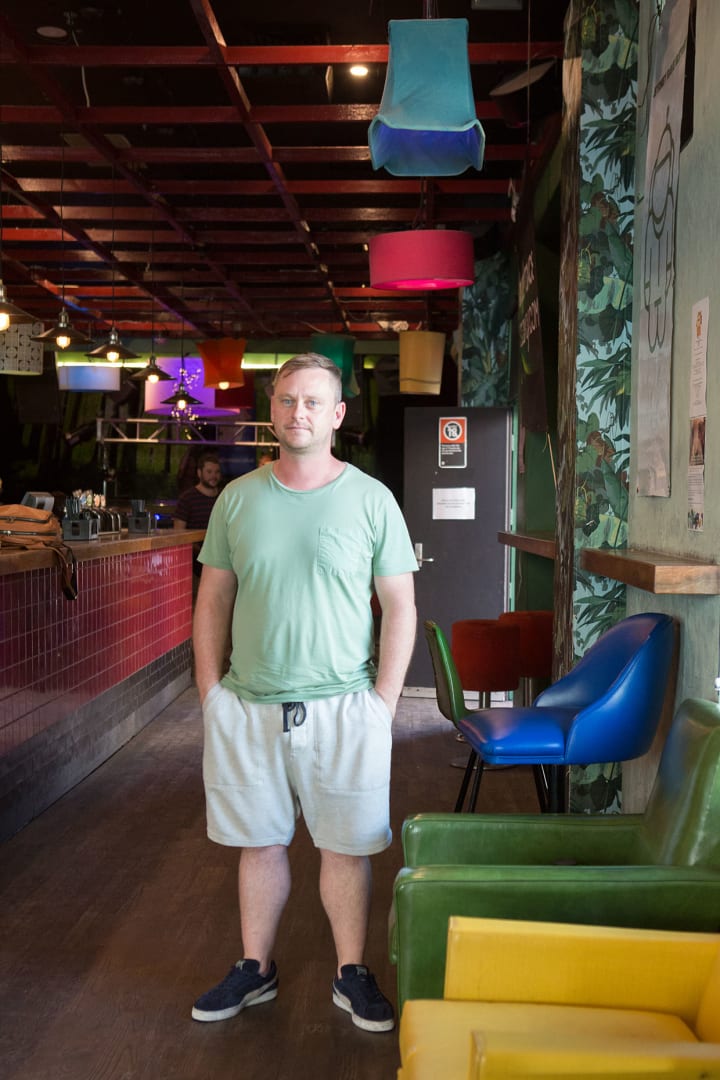
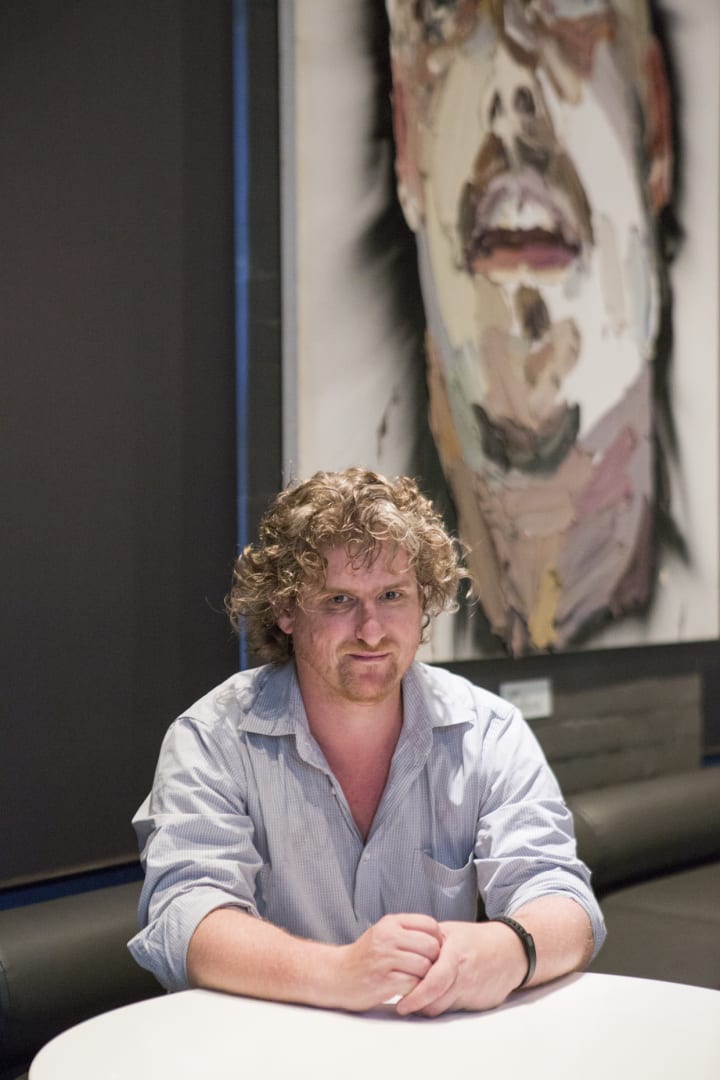
John Wardle, one-half of the Live Music Office, explains the changing laws regarding New South Wales’ live music industry.
The Live Music Office was established in 2013, and its principal responsibility is to advocate for venue-based live music. We’ve got two staff members: a policy role and an audience and sector development role. I look after the policy regulation strategic work. My background was in reforming the NSW Liquor Act 2007 and the planning laws in New South Wales. From those campaigns we changed the building code, planning laws and liquor licensing framework, and it was done in a coordinated manner. Much of that work still needs to be done in the low risk space in planning policy; we don’t have a clear definition of “low risk” or a response that does not require extensive building work. Low risk is going to be a strategic area for policy development.
An example of what the government deems a “high risk” space is a dark theater where you’re up three floors and you’ve got tiered fixed row seating, so you’re disorientated, as you’ve never been there before. You’d be required to enact an appropriate building and fire safety response to that. If you’re on the ground floor in an open space, then is the same building compliance regulations required? I’d argue not.
The lockouts are one of a number of issues in New South Wales. There’s a liquor freeze in the city of Sydney that has expanded with the lockouts. That means no new liquor licenses will be issued. There are exemptions for small, 60-capacity bars, as they are considered “low risk.” In Melbourne there’s an exemption for 200-capacity live music venues from the liquor freeze. That’s something that we will be advocating to the government: more of a tiered, nuanced response as one of a number of responses within the plan of management lockouts. In time I’m certain that we’ll see a more nuanced response.
It’s a long game, but I think we’ll see recognition of low risk in time and we’ll get to see some changes. It’s a culture of regulation, in which we still believe that some activities should require approval and others shouldn’t. We got rid of that in many ways in 2009 when New South Wales changed the planning system, but this is regulation by bracket creep reemerging, which means gradual amendments are made to existing regulations to over time increase the volume of restrictions in existence. If you look at restaurant conditions that are in the newspapers today, you’ll see it’s still happening. We need to work together. In New South Wales we don’t get to sit down around the table at the state level with police and liquor licensing and planning and local government, whereas I do exactly that in [other Australian states] South Australia and Victoria.
Kings Cross has got an incredible heritage of contributing to Australian music. It’s a very longstanding crucible, a mixing pot where musicians would meet and mix and perform, and it has a great history of being a place where musicians would hang after their shows. It’s now undergoing a rapid transformation. We’re watching it unfold. We’re working with the state government on the evaluation of the plan of management.
But it’s not just the lockouts; it’s also the liquor freeze, which prevents new venues from coming in. The government advised last week that the liquor freeze will be renewed and will continue for at least another year. That is problematic for me because if you recognize that you’ve got a night economy with problems, then we should be looking at encouraging the sort of night economy that we’d like. People in the arts and culture sector would think that music venues, theaters and galleries are the sort of licensed premises that would be contributing to that economy.
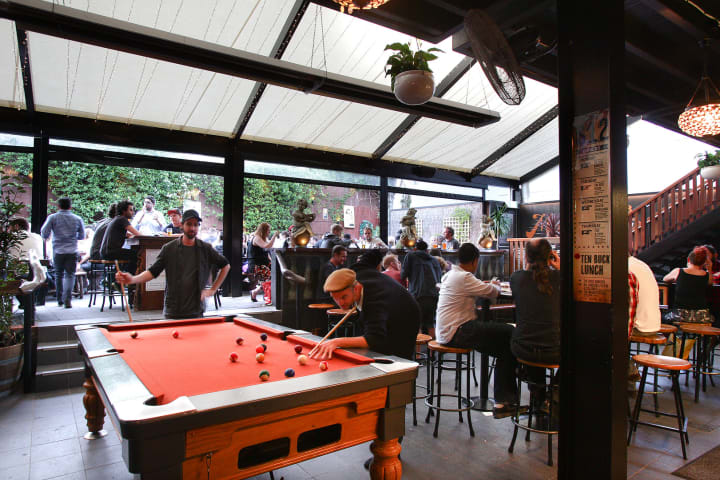
Over a post-work meal, the anonymous promoters put to rest the oft-repeated myth that that while clubs are suffering, warehouse parties are reaping the rewards of Sydney lockouts.
It’s not even six months ago that we started. It was in the cards, as we were talking about it a year ago. Two years ago, one of us started another project—a similar thing, but a different vibe and crowd; it’s more house music and disco than what we’re doing now. Doing that helped us decide what we wanted to do with this.
We met partying, and the genre of music that we bonded over the most was techno. We wanted to throw a really hectic, banging party that we could have fun at, basically. We don’t want to say that we were influenced by Berlin, but we sort of admire that ethos where there are no rules. It’s the perfect answer, especially in the climate that we’re in, where we’re governed by these ridiculous rules.
It’s just hard to do things in clubs or warehouse at the moment. It’s scaled back. All the warehouse parties are being shut down. So many music venues have closed down, and they seem to be crunching down on all the alternatives too—anywhere that gets a little bit of traction. Recently we heard that there’s a task force in the area where a lot of the warehouses are and they’ve contacted many of them. We don’t know what the fine is, but it’s pretty threatening. Most recently, for our last party, we had booked a venue and then they had pressure from the police. It’s a huge risk for a venue owner, and we totally respect that. We were fortunate to have a contact at another warehouse, pretty much the only existing one that we have left in Sydney.
There’s also the bunker raves, but they’re really red-hot as well. They’re great parties while they last, but they might last for an hour and a half. We recently had a party in a bunker in [the exclusive suburb] Vaucluse, which is the last place you’d expect for a party to last. It was maybe 100 meters from an $8 million house, but just the way we had it set up—we didn’t have a subwoofer, we just had the PA facing out to sea, and we kept everyone inside the bunker. We started the party at 11 or 12. We thought maximum we’ll go to 1 or 2, but we went till 6:30. That was just pure luck. You can’t predict that kind of thing, which sucks. To be honest, after this next party, we feel like it’s going to be pretty hard to find more spaces. We lucked out with this next one. There’s not really any other options.
The topic of lockouts is really negative, and quite frankly the situation is dire. I mean, we’re trying to do something and we’re completely under threat, but completely disconnected from the lockouts. The reason we still live here and really enjoy throwing parties is because the electronic music scene here is so strong and supportive, and the party people are fucking fabulous. So we think that’s worth it at the end of the day. There needs to be more resistance to the government regulations. It’s really difficult to be up against what we’re up against in Sydney because it’s driven by money. If they didn’t have the casino and that whole thing going on, they’d have such a better argument, but they’re just contradicting themselves. It’s not like they’re even trying to cover their tracks; it’s pretty obvious. It’s just really sad, and the impacts are far greater than just being disheartened.
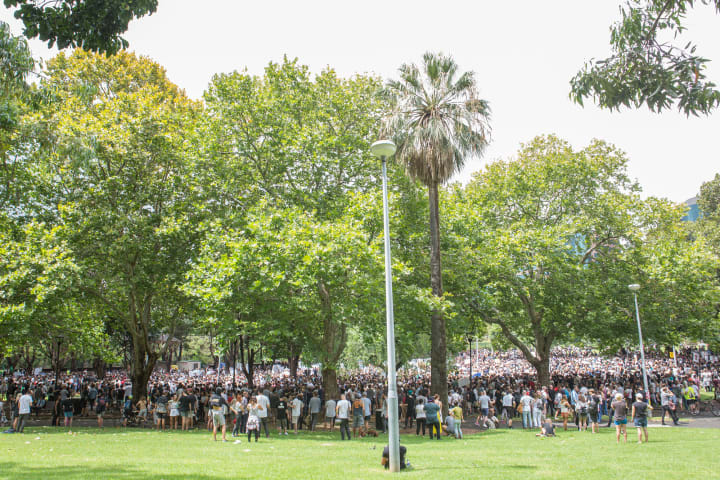
Back in October 2014, when a Kings Cross club called The Backroom joined a growing list of venues that shut in the wake of the lockouts, Australian music website Stoney Roads tagged Barry O’Farrell in their about the closure and its connection to the lockouts. O’Farrell’s response was cool and cutting. “Thx for letting me know,” he wrote, along with the hashtag #notearsshed.
For critics of the lockouts, myself included, it is very tempting to fall into hyperbole—especially when it feels like the opposing side cannot or will not empathize with your perspective or straight up doesn’t give a shit. It feels easy to declare Kings Cross a dead, empty shadow of its former self, but in fact it’s still buzzing, albeit with a different economy and clientele. As nightlife is pushed out, more developers circle the Cross’s well-located properties, and investors who may not have considered the area a few of years ago now won’t hesitate to throw down a multi-million-dollar sum. New Kings Cross’ residents are probably just thrilled to walk to work, invite their parents over for dinner or have Sunday brunch al fresco without seeing booze puke on the sidewalk or sweaty people emerge from basement clubs. But there is nothing to say that this person’s lifestyle is definitively better than anyone else’s—or vice versa.
Nevertheless, the effects of this type of shift results in fewer opportunities and less feasible options for Sydney’s cultural producers, especially those who populate less-mainstream scenes that aren’t as likely to survive in a money-driven market. This is all bad news for Sydney’s creative communities. But what is worse is the NSW government’s willingness to bundle this in the rhetoric of family safety and public fear while effectively turning a blind eye to—and in fact, funneling customers into—one of the city’s most egregious offenders: The Star Casino.
Throughout 2015, supports of O’Farrell’s successor, Mike Baird, crowed about the falling crime numbers in Kings Cross without acknowledging that the total number of people there had fallen as well. But in early 2016 the tide has finally started to turn. In February a lengthy, stinging and at times hyperbolic tirade against the lockouts, their hypocrisies and implications went viral. Its success—“a growing hysteria,” according to Baird—earned a tone-deaf response from the Premier on Facebook. “We introduced laws to curb violence and to eliminate drinking ghettos by redistributing the nightlife across the city, making the whole city more vibrant,” he wrote. “Now, some have suggested these laws are really about moralizing. They are right. These laws are about the moral obligation we have to protect innocent people from drunken violence.” The following day, the director of the state’s Bureau of Crime Statistics rebutted with evidence that violent drinkers hadn’t disappeared; rather, they had “simply scattered to wherever they came from.”
While #notearsshed revealed the government’s unrepentant attitude, the new trending nickname protestors have hurled at the current Premier —#casinomike—suggests that a vocal section of Sydney demands to know, publicly, what the government truly values. Whether the impact on local nightlife is an unintended consequence of a conservative policy or the byproduct of a deeply cynical plan to upend the casino industry, the end result is the same: one small interest group has been allowed to flourish while others face continued contraction. For those in the good favor decision-makers, there’s a lot of money in the sale and service of alcohol in the lockout era. And there’s a lot of money to be made in casinos, too. But there is no positive value—financial or otherwise—for a society in which a person believes that raising their fists is a good idea. If the zeal with which alcohol was dissected had been applied to deconstructing the issues that really fuel street violence, antisocial behavior, juvenile delinquency and domestic assaults, the entire spectrum of Sydney society would benefit.
Christine Kakaire is an Australian journalist from Sydney. She has contributed to Pitchfork, Red Bull Music Academy, Resident Advisor and more.
Published March 04, 2016.
